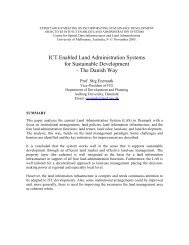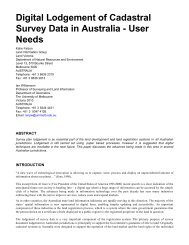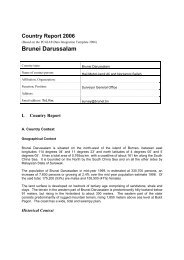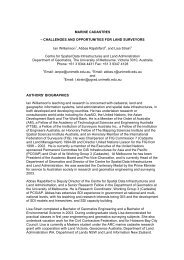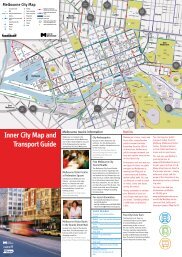A Local-State Government Spatial Data Sharing Partnership
A Local-State Government Spatial Data Sharing Partnership
A Local-State Government Spatial Data Sharing Partnership
Create successful ePaper yourself
Turn your PDF publications into a flip-book with our unique Google optimized e-Paper software.
A <strong>Local</strong>-<strong>State</strong> <strong>Spatial</strong> <strong>Data</strong> <strong>Sharing</strong> <strong>Partnership</strong> Model to Facilitate SDI Development<br />
Table 5.3 Contribution of partnerships to SDI development<br />
SDI Component Victoria PIP Queensland PLI Tasmania LIST<br />
<strong>Data</strong><br />
- appropriateness<br />
- shared value<br />
- quality<br />
- reliability<br />
- timeliness<br />
People<br />
- partnership managers<br />
- partnership operations<br />
- users and resellers<br />
Institutional<br />
framework<br />
- co-ordination bodies<br />
- policies<br />
- legislation<br />
- communication<br />
Standards<br />
- national standards<br />
- data models<br />
- metadata<br />
- transfer standards<br />
Technology<br />
- level of technology<br />
- access networks<br />
- maintenance/update<br />
The PIP data has<br />
become essentail to both<br />
partners. Quality of data<br />
is satisfactory and<br />
improving. Timeliness<br />
and reliability are ongoing<br />
issues.<br />
Overall good leadership<br />
and a high level of<br />
management of the<br />
partnership. Process is<br />
under-resourced in a<br />
number of components.<br />
User and reseller base<br />
growing.<br />
Policy development<br />
preceded main initiative.<br />
Generally strong upper<br />
level support from state<br />
co-ordination body. High<br />
level of partner<br />
communication.<br />
Key data set of address<br />
is built to comply with<br />
new national address<br />
standard. Metadata<br />
development ongoing.<br />
Transfer standards more<br />
complex due to eight<br />
different vendors.<br />
New data model required<br />
to deliver improved<br />
efficiencies.<br />
<strong>Data</strong> is delivered and<br />
accessed through Land<br />
Channel portal.<br />
Automation of update and<br />
maintenance has become<br />
critical.<br />
152<br />
The PLI data has not<br />
reached maturity or<br />
achieved recognition of<br />
value. Quality is<br />
generally poor although<br />
improving in recent times.<br />
Issues of reliability and<br />
timeliness.<br />
Limited overall leadership<br />
and support, lacks project<br />
management and is<br />
under resourced. Limited<br />
supply chain<br />
development or cross<br />
agency usage.<br />
Initially developed under<br />
state coordination body<br />
(QSIIC). Policy<br />
development focussed on<br />
cost recovery initially until<br />
2004 data share policy.<br />
Poor institutional support<br />
and partner<br />
communication.<br />
PLI initially built with the<br />
older address standard.<br />
Metadata is limited.<br />
Transfer standards are<br />
slowly being addressed.<br />
<strong>Data</strong> has not made its<br />
way to the state SDI as<br />
such. No public access<br />
available to mapping or<br />
address data.<br />
Maintenance process and<br />
model must be updated.<br />
Overall quality of data is<br />
good but further<br />
improvements required.<br />
Shared value of data is<br />
recognised. Timeliness<br />
and reliability satisfactory<br />
and integrated into state<br />
SDI.<br />
High level government<br />
sponsorship, strong<br />
project leadership and<br />
management, larger and<br />
diverse user base,<br />
operations are well<br />
coordinated and<br />
resourced.<br />
Good coordination and<br />
management through<br />
LICC. Policy<br />
development appropriate<br />
but may require<br />
modification. No<br />
legislative framework.<br />
Communication levels<br />
appear satisfactory.<br />
<strong>Data</strong> models and<br />
standards for the<br />
exchange and<br />
maintenance were<br />
developed as part of the<br />
agreement. Strong<br />
emphasis of metadata,<br />
linkage to LIST and end<br />
users.<br />
<strong>Data</strong> is delivered through<br />
the LIST for both public<br />
and commercial access.<br />
Technology is highly<br />
developed and provides a<br />
good model for future<br />
developments.<br />
Although the overall data quality from the data sharing initiative is high, further<br />
improvements are required to ensure a high level of business and user confidence. In<br />
particular, under-resourcing of the data maintenance process is now having an adverse<br />
impact on the project. Apart from the under-resourcing, the data maintenance, institutional<br />
framework and the overall partnership management appears sound.<br />
The application of standards and recognition of metadata at both state and local<br />
government level has been successfully developed from an initial low base. The delivery<br />
of PIP data over the Land Channel portal is clear evidence of the partnership’s contribution<br />
to the <strong>State</strong> SDI. The PIP data sets in the form of the digital mapbase and street address<br />
are critical to delivery of the <strong>State</strong>’s spatial information via this portal. As identified in the



